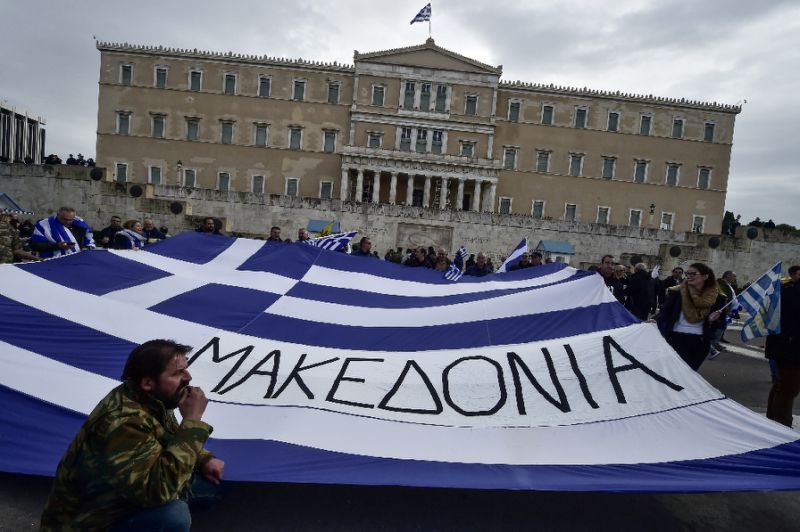Scepticism in Greece and Macedonia over proposed name deal

Agency
June 14, 2018

ATHENS – Greeks and Macedonians expressed scepticism on Wednesday over a proposed compromise deal to end a nearly three-decade name row between their countries which has blocked Skopje's bid to join the EU and NATO.
The leaders of the neighbouring countries hailed a "historic" agreement on Tuesday to rename the tiny Balkan nation the Republic of North Macedonia after months of intensive talks.
However Greece's conservative opposition quickly branded the deal a "national retreat", while Macedonia's nationalist President Gjorge Ivanov stormed out of a meeting with the prime minister and foreign minister in protest.
"President Ivanov interrupted the meeting and left refusing to talk about the benefits of this historic agreement on the Macedonian future," Macedonia's government said.
The meeting lasted less than three minutes, officials said.
Macedonia's nationalist VMRO-DPMNE party condemned the deal as "an absolute defeat of the Macedonian diplomacy in every possible way."
There was also reluctance on the streets of Skopje.
"We went too far, we allowed too much," said Suzana Turundzieva, a 46-year-old retail worker.
Athens however defended the deal.
"I believe that yesterday we made a very decisive step for the stability of the broader Balkan region," Greek government spokesman Dimitris Tzanakopoulos told state TV ERT.
Greece has long objected to its northern neighbour being called Macedonia because it has its own northern province of the same name, which in ancient times was the cradle of Alexander the Great's empire -- a source of intense pride to modern day Greeks.
The breakthrough was quickly welcomed by the United Nations, NATO and the EU, with European Council president Donald Tusk tweeting: "Thanks to you the impossible is becoming possible."
- 'A trick' -
However both governments face significant hurdles at home over the deal, with the countries' main opposition parties refusing to support it.
Street protests have also been held in both nations against any compromise, and additional demonstrations are expected in Greece in the coming days.
Even Greeks who admit the row had gone on too long say the compromise was painful and could still leave their country empty-handed.
"I agree with a heavy heart... because they had left the issue for 26 years and I guess that nothing better could have been done at this point," said technician Christos Nikolopoulos.
"All this is a trick for the Balkans to become a protectorate of NATO," chafed Vassilis, a 20-year-old waiter.
Much of the criticism in Greece has focused on the government's acceptance that the neighbouring country's language and ethnicity will be called "Macedonian".
"The acceptance of the Macedonian language and nationality is an unacceptable national retreat," said main opposition leader Kyriakos Mitsotakis.
Others argue that with Turkey proving an increasingly volatile neighbour, it made sense to close the long-running diplomatic dispute.
- 'Great diplomatic victory' -
Macedonian Prime Minister Zoran Zaev welcomed the deal on Tuesday, saying "we have a historic solution after two and a half decades. Our agreement includes Republic of North Macedonia for overall use".
Greek Prime Minister Alexis Tsipras declared it "a great diplomatic victory and a great historic opportunity" for the region to have "friendship, cooperation and co-development".
The agreement still needs to be approved by Macedonia's parliament and pass a referendum there, as well as be ratified by the Greek parliament.
Critics say Tsipras, who has a slim majority in parliament, lacks legitimacy to enforce the deal because his nationalist coalition partner has refused to support it.
But he is expected to be able to get the deal approved thanks to the backing of a number of smaller Greek opposition parties.
Observers have warned there was a real risk that the world would simply continue referring to the country as "Macedonia", which would constitute a major failure for Greece.
Questions were also raised about what Greece could do if a hardline government comes to power in Skopje and refuses to carry through the promised reforms -- including an overhaul of vehicle license plates, passports and administrative documents -- as the procedure is likely to take years.
"This looks like a preliminary deal, there are many phases of implementation, so we should restrain our expectations," Greek analyst Constantinos Filis told SKAI TV.
Skopje hopes to secure a date to begin accession talks at an EU summit in late June, and an invitation to join NATO in mid-July.
---


Leave Comment